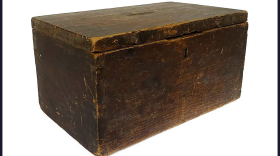
On Walter Edgar’s Journal, Walter Edgar delves into the arts, culture, and history of South Carolina and the American South, to find out, among other things... the mysteries of okra, how many "Reconstructions" there have been since the Civil War, and why the road through the Supreme Court to civil rights has been so rocky.
Join him, co-host Alfred Turner, and their guests the first and third Thursday of each month for the revamped Walter Edgar’s Journal podcast.
Many of the books discussed on this program are available in the "Walter Edgar's Journal Book Nook" section at All Good Books in Columbia, SC.
Click here to contact the show.
Click here to listen to South Carolina from A to Z.
Click here to play the Dr. Walter Edgar's South Carolina Quiz!
-
The book, Gullah Culture in America (Blair Publishing), chronicles the history and culture of the Gullah people, African Americans who live in the Lowcountry region of the American South. Written by Wilbur Cross in 2008, it chronicles the arrival of enslaved West Africans to the sea islands of South Carolina and Georgia; the melding of their African cultures, which created distinct creole language, cuisine, traditions, and arts; and the establishment of the Penn School, dedicated to education and support of the Gullah freedmen following the Civil War.Dr. Eric Crawford, editor, of the book’s second edition (2022), is a Gullah Geechee scholar and Associate Professor of Musicology at Claflin University in Orangeburg. He joins us to talk about Gullah culture and about updating the late Dr. Cross’ book.This is an encore presentation from September 29, 2023.
-
This week, in a "nod to all things Southern," we’ll be talking with Dr. John Shelton Reed about his book, The Ramos Gin Fizz (Iconic New Orleans Cocktails) (2025, LSU Press).In the book, John attempts to reconstruct Ramos’s original recipe using modern ingredients and addresses the question of how and how much to shake the drink, a subject on which there is surprisingly much to be said. Offering recipes for the original drink, a modern version, and many imaginative riffs, this eminently readable book is a must-have for any cocktail lover’s library.
-
(Broadcast on SC Public Radio on December 12, 2025) – Today we are featuring a very special edition of the Journal, taken from a live broadcast on SC Public Radio on December 12. Sean Birch, Director of SCPR, will be your host, talking with Walter Edgar and Alfred Turner about the 25th anniversary of Walter Edgar’s Journal. The program features questions and comments from our radio audience and clips from past programs.
-
Today our guest is Mt. Pleasant native Grady Hendrix, author of the horror novel Witchcraft for Wayward Girls (2025, Berkley Books).The novel is set in Florida in 1970 and is about a group of pregnant teenage girls, living in a maternity home for unwed girls, who discover a book on witchcraft. For the first time in their lives power seems to be in the hands.We’ll talk with Grady about this latest book, as well as some of his past ones, and explore how he came to specialize in the horror fiction genre.
-
This week we'll be talking with Dr. Jennifer Whitmer Taylor of Duquesne University about her book, Rebirth: Creating the Museum of the Reconstruction Era and the Future of the House Museum (2025, University of SC Press).In Rebirth, Taylor provides a compelling account of how to reenvision the historic house museum. Using the Museum of the Reconstruction Era—known as the Woodrow Wilson Family Home for most of its many years as a house museum—as a case study, Taylor explores the challenges and possibilities that face public history practitioners and museum professionals who provide complex interpretations of contested public memory.
-
This week Walter will be talking with documentary filmmaker Ken Burns about the American Revolution, focusing on the routing of the British and their allies by revolutionary Partisans during Cornwallis’ Southern campaign.Ken will also tell us a bit about his upcoming PBS documentary, The American Revolution. The six-part, 12-hour documentary series explores the country’s founding struggle and its eight-year War for Independence.
-
Today we’ll be switching things up a bit. Instead of Walter and me interviewing a guest we will have a guest interviewing Walter.The conversation is part of the Spring 2025 program put on by the University South Caroliniana Society: “'E' is for Edgar – Conversation and Barbeque with Walter.” Talking with Walter today is Beryl Dakers, president of the Society and long-time producer with SCETV. Today's episode is part of our celebration of Walter Edgar's Journal's 25th year.
-
This week we’ll be talking with Dr. Kathleen DuVal about native Americans in Colonial South Carolina.Long before the colonization of North America, Indigenous Americans built diverse civilizations and adapted to a changing world in ways that reverberated globally. And, as Kathleen will tell us, North American civilization did not come to a halt because of a few wandering explorers, even when the strangers came well-armed.Much of our discussion today is based on Kathleen DuVal’s Pulitzer Prize-winning book Native Nations: A Millennium in North America.
-
This fall we are celebrating 25 years of Walter Edgar’s Journal!We thought that a good way to start that celebration would be to look back on the launch of our podcast. So, this week we bring you an encore of our final *broadcast* episode of May 2023.Our guest was the Director of SC Public Radio, Sean Birch. We reminisced about the Journal’s beginnings and present highlights from our years on the air. And we talked about how morphing Walter Edgar’s Journal from a weekly broadcast into a semi-monthly podcast would allow us to focus more intently on our mission to explore South Carolina’s history and its culture.
-
This week we’ll be talking with Nic Butler, the historian at the Charleston County Public Library, who is researching the life of George Anson. Anson, was an officer in the British Navy who, by the time of his death in 1762, had risen to its highest rank, First Lord of the Admiralty. He had also spent 9 years in South Carolina during its time of transition from a colony governed by the Lords Proprietors to a colony of the British Crown.











